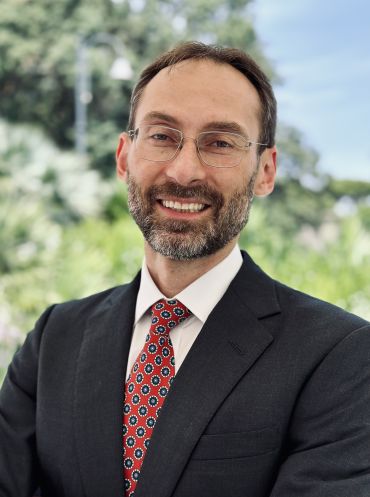 Professor Michael Bronstein. Image credit: Gabriella Sbordone.
Professor Michael Bronstein. Image credit: Gabriella Sbordone.
Directed by Professor Michael Bronstein (DeepMind Chair in Artificial Intelligence, Department of Computer Science), the Oxford hub will focus on the mathematics and computational research that underlies AI and could unlock new, more efficient AI systems. The center will notably seek new breakthroughs in AI by using theoretical tools from currently under-explored mathematical fields.
The research program will focus on developing rigorous mathematical answers to four fundamental questions that underpin modern AI and machine learning systems:
- How can mathematical approaches be used to reveal hidden structures in data that can be exploited by a new class of machine learning models?
- Can mathematical tools be used to characterize machine learning models to understand when and how they work and fail?
- How can we ensure that learning and optimization algorithms benefit from the structures underlying machine learning models, to develop better, more efficient and safer AI models?
- How can we build self-adaptive AI systems that understand their limitations and can safely make decisions potentially affecting billions of people?
Professor Bronstein said: “In 1872, Felix Klein published his now famous Erlangen Program – a radical new unifying theory for geometry which had a profound impact on mathematics in general, leading to the emergence of many new areas. The time has come to establish an “Erlangen Program” for AI, based on rigorous mathematical principles that would provide a better understanding of existing AI models as well as a new generation of methods.
This new research program will break down barriers between different fields and bring together a diverse cohort of leading UK experts rarely seen together with the aim of strong cross-fertilisation. In addition to exploiting tools from currently under-explored mathematical areas, this work will draw the attention of theorists to new problems and applications related to AI and machine learning.
Professor Michael Bronstein (Department of Computer Science, University of Oxford)
Although based in Oxford, the hub will have wide geographical coverage across the UK, bringing together leading experts in the mathematical, algorithmic and computing fields that underpin AI and machine learning systems as well as their applications in scientific and industrial contexts. Close links with a range of industrial partners will enable the research team to test promising models in applied contexts and achieve early impact.
Professor Bronstein added: “Mathematicians from a wide range of different fields – particularly geometry, topology and probability – will benefit from this gateway to new problems, applications, opportunities and collaborations. At the same time, researchers working in machine learning and AI will benefit from the transformative influx of new expertise, new ideas and new tools. Overall, we expect transformative cross-fertilization.
The hub will also contribute to the development of the next generation of AI researchers and will train at least 13 doctoral students. By acquiring a rare combination of knowledge and skills in the mathematical and algorithmic foundations of AI and its applications, they will be well placed to develop cutting-edge AI systems in the UK and beyond.
UKRI helps researchers and innovators develop the next generation of AI technologies that will transform our economy and society. The investments announced today will help provide the capacity the UK needs to take advantage of the opportunities offered by this transformative technology.
Professor Dame Ottoline Leyser, Director General of UKRI
AI Minister Viscount Camrose said: “The investments we are making in these new projects are only possible because of our pro-innovation approach to AI. The response to the consultation on the White Paper on AI Regulation we presented today will enable us to move forward with this plan, driving forward the next wave of brilliant innovation in AI AI. These hubs will foster new cutting-edge advances, from health treatments and more energy-efficient electronics to machine learning and chemical discovery.
Professor Charlotte Deane, Executive Chairman of the EPSRC and Professor in the Department of Statistics at the University of Oxford, said: “Artificial intelligence is already transforming our world. The EPSRC supports world-leading research to unlock its potential and ensure it is developed and used ethically and responsibly. Long-term research funding has led to revolutionary advances that have made AI a powerful tool for many applications.
“These hubs will provide groundbreaking AI innovations and tools in sectors ranging from health and energy to smart cities and the environment. They will do this by solving key challenges and improving our understanding of AI, helping to drive the increased productivity and economic growth promised by this technology.
As well as the University of Oxford, the program involves researchers from the University of Aberdeen, University of Durham, Imperial College London, Queen Mary University of London and the University of Southampton.
More information on the new AI research hubs is available on the UKRI website.


